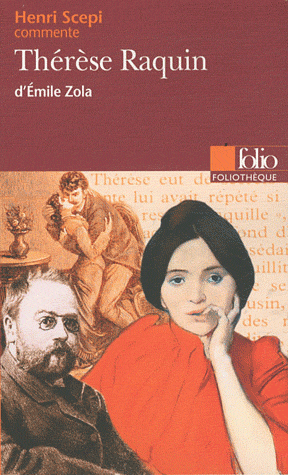Thérèse Raquin

One of the first novels of Émile Zola, published in 1867 before he began his magnum opus, the Rougon-Macquart series, Thérèse Raquin tells the story of an adulterous young woman who kills her husband and marries her lover. It doesn't go well.
Thérèse is the daughter of a French captain and an Algerian mother. Her father brings her to France to be brought up by his sister Madame Raquin alongside her son Camille, after which he is never seen again. Thérèse grows up extremely repressed because her desires are always secondary to Camille's demands, wishes, and physical limitations. When she is twenty-one, Madame Raquin marries her to Camille, a marriage without affection on both sides. Camille decides to move the family to Paris so he can start a career.
In Paris, Camille finds work with the railroad while Mme. Raquin and Thérèse set up a hat shop. He also finds Laurent, a childhood friend of his who has grown up to be tall, handsome, and a hedonist. Laurent begins an affair with Thérèse because she is lonely and because he can't afford prostitutes anymore. He visits her daily, until his boss doesn't let him skip out of work anymore, and the lovers must come up with a new plan. They resolve they must murder Camille and then Thérèse will be free to marry Laurent.
Unfortunately for them, they didn't really consider what life as secret murderers would be like, and their crime slowly starts to drive them mad.
Was loosely adapted by Park Chan-wook as Thirst.
- And I Must Scream: Mme. Raquin literally can't scream anymore when she realized Thérèse and Laurent have killed her child. She does try to rat them out, but fails, which makes this even worse.
- Arranged Marriage: Camille and Thérèse
- Asshole Victim
- Break the Cutie: Madame Raquin
- But Not Too Black: Thérèse has an African mother, but doesn't look any different from women of European ancestry.
- Algerians are frequently not very dark--it's North Africa; their historical allegiance and kinship is to the Mediterranean, not the continent.
- After WWII during the long-drawn fight for independence, Algerian women in Algiers were apparently able to pass for Frenchwomen by cutting and curling their hair and wearing the latest fashions, so as to get through checkpoints without having their bags searched--and place bombs.
- Can't Have Sex Ever: After Camille dies, Laurent and Thérèse find they are unable to have sex. Partly because they keep imagining they see him in their bedroom.
- Can't Live with Them Can't Live Without Them: Life with Camille was actually a lot better than life without him, even though both Laurent and Thérèse couldn't stand him. His death means they can't reset anything, though.
- Despair Event Horizon: Madame Raquin when she learns that Thérèse and Laurent murdered Camille.
- Disappeared Dad: Camille's father is nowhere in the story. His mother raises him alone. Thérèse too, because Mme. Raquin's brother disappeared as well, leaving his daughter behind.
- Doomed Moral Victor: Mme. Raquin watches Thérèse and Laurent die and gets satisfaction that her son is avenged. However, the ending is ambiguous as to her fate. The implication is she died not long after, but even if she didn't her paralyzed and silent state means that she is completely dependent and will die unless someone finds her.
- Downer Ending: Hoooooo boy.
- Emotionless Girl: Thérèse, for her entire childhood. She is incredibly repressed because it's the only way to make life with her aunt and cousin bearable.
- Finishing Each Other's Sentences: The least romantic example possibly ever. Thérèse and Laurent each realize the other was going to kill them and have a very honest conversation about it before committing suicide.
- Four-Temperament Ensemble: The four main characters.
- Sanguine: Laurent
- Choleric: Madame Raquin
- Melancholic: Thérèse
- Phlegmatic: Camille
- Hero Antagonist: Mme. Raquin, who is oppressive of Thérèse in her youth and later determined to expose her as a murderer.
- I See Dead People: Thérèse and Laurent see Camille all the time, though this is a manifestation of guilt and madness. Instead of his ghost, though, they see his bloated, drowned corpse.
- Ingenue: Madame Raquin
- It Got Worse
- Jerkass: Laurent
- Kissing Cousins: Camille and Thérèse, though their marriage didn't involve much, if any, sexual activity.
- Make It Look Like an Accident: Everyone else believes that Camille fell out of a boat and drowned.
- Meaningful Name: The name Thérèse Raquin has been speculated to have something to do with the saying "You reap what you sow." Thérèse meaning "to harvest" and Raquin coming from the colloquial verb raquer meaning "to pay" or "to cough up."
- Murder the Hypotenuse: Thérèse and Laurent together kill her husband, Camille.
- My Beloved Smother: Madame Raquin, though she doesn't really mean to be. But she babies Camille and rules over Thérèse.
- One Name Only: Laurent. We're never told if that's his first or last name.
- Parental Abandonment: Thérèse's father leaves her with Madame Raquin because he doesn't believe he's fit to raise children and her mother is dead.
- Platonic Life Partners: Camille and Thérèse's marriage.
- Sanity Slippage: The more time passes, the more Thérèse and Laurent are haunted by memories of Camille.
- The Speechless: Madame Raquin, as her health deteriorates, leaving her with locked-in syndrome. Ironically, the worse she gets, the more she realizes what happened to her son.
- Spoiled Brat: Camille was cosseted so much as a child, that he's completely intolerable to everyone but his mother.
- Spooky Painting: Everything Laurent does after the murder.
- Villain Protagonist